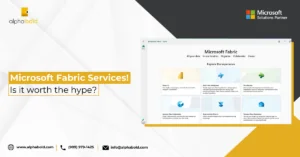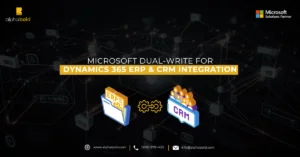Table of Contents
Introduction
Microsoft Dynamics 365 is a powerful tool that allows businesses to streamline their processes and improve efficiency. According to Gartner, the CRM market, led by solutions like Dynamics 365, grew by 12.6% in 2021, highlighting the increasing reliance on CRM systems for business success. Staying ahead of the curve is crucial, and Microsoft’s recent deprecation of Xrm.Page in Dynamics 365 in favor of formContext is a significant shift. This transition can directly impact your organization’s CRM performance and development efficiency. This article explores why this transition is vital, how it can benefit your business, and how AlphaBOLD can guide you through a seamless upgrade.
Why Understanding These Changes is Crucial
For businesses, understanding changes like the transition from Xrm.Page to formContext is critical for several reasons:
- Enhanced Performance and Efficiency: Adopting formContext can lead to improved application performance, which directly impacts user satisfaction and productivity.
- Future-Proofing: Transitioning to formContext ensures that your CRM system remains compatible with future updates and features from Microsoft, protecting your investment.
- Unified Interface Compatibility: formContext supports the Unified Interface, offering a consistent and optimized user experience across different devices, which is crucial for businesses with diverse operational needs.
- Improved Development Practices: Understanding and leveraging new frameworks like formContext allows for more modular, maintainable, and scalable code, reducing long-term development costs and complexities.
Further Reading: How Microsoft Dynamics 365 CRM Benefits Small Businesses
Understanding the Deprecation of Xrm.Page
Xrm.Page has been a core component of Dynamics 365, offering context for form or item events. However, with the release of version 9.0, Microsoft deprecated Xrm.Page, transitioning to formContext to better support the new Unified Interface. This change provides a consistent experience across devices, ensuring your CRM system remains efficient, adaptable, and future-proof.
Embracing formContext
formContext provides the same capabilities as Xrm.Page but in a more structured and efficient manner. It is passed as the first parameter to form event handlers, referencing the current form or item being interacted with.
function onFormLoad(executionContext) {
var formContext = executionContext.getFormContext();
var accountName = formContext.getAttribute(“name”).getValue();
console.log(accountName);
}
In this example, formContext is used to retrieve the value of the “name” attribute from the form.
Benefits of Using formContext
formContext provides several benefits over the deprecated Xrm.Page:
- Elevate User Productivity: A consistent user interface across all devices (desktop, tablet, mobile) means your teams can access and update CRM data seamlessly, regardless of their location or preferred device. This translates to faster response times, improved data accuracy, and increased productivity.
- Reduce Development Costs: formContext’s contextual awareness enables your developers to write more targeted and efficient code. This streamlined development process reduces time to market for new CRM features, lowers maintenance costs, and frees your development team to focus on higher-value projects.
- Accelerate CRM Performance: formContext’s superior efficiency over Xrm.Page directly impacts your CRM’s responsiveness and speed. This translates to quicker data retrieval, faster form loading, and a smoother user experience, ultimately boosting user adoption and satisfaction.
- Protect Your CRM Investment: By transitioning to formContext now, you ensure your CRM remains compatible with Microsoft’s future updates and enhancements. This eliminates the risk of future costly code rewrites or system downtime, safeguarding your investment and maximizing its long-term value.
Drive Revenue Growth with Dynamics 365, Customized by AlphaBOLD
Unlock the full potential of Dynamics 365 with a tailored solution designed to streamline operations, improve customer engagement, and drive measurable revenue growth.
Request a DemoTransitioning from Xrm.Page to formContext
Transitioning from Xrm.Page to formContext is straightforward. The main difference is that formContext is accessed through the executionContext parameter of the event handler rather than being globally available.
Below is an example of transitioning a piece of code from Xrm.Page to formContext.
Before Using Xrm.Page:
function onFormLoad() {
var accountName = Xrm.Page.getAttribute(“name”).getValue();
console.log(accountName);
}
After using formContext:
function onFormLoad(executionContext) {
var formContext = executionContext.getFormContext();
var accountName = formContext.getAttribute(“name”).getValue();
console.log(accountName);
}
As you can see, the transition involves minimal changes to the code.
AlphaBOLD: Your CRM Modernization Partner
Navigating technical transitions like this can be challenging. AlphaBOLD specializes in Dynamics 365 and understands the nuances of this change. We offer:
- Expert Guidance: Our experienced team will assess your current setup and tailor a migration plan to your needs.
- Minimized Downtime: We ensure a smooth transition with minimal disruption to your daily operations.
- Optimized Performance: We’ll fully fine-tune your CRM to utilize formContext’s capabilities.
Ready to Modernize your Dynamics 365 Applications?
See formContext in action! Schedule a free consultation with our experts to explore how we can help you transition smoothly to formContext.
Request a ConsultationConclusion
The transition from Xrm.Page to formContext is more than just a technical update; it’s a strategic move towards a more efficient, user-friendly, and future-proof Dynamics 365 CRM. By embracing this change, your organization can unlock enhanced performance, streamline development efforts, and maximize the value of your CRM investment.
Don’t let outdated code hold your business back—partner with AlphaBOLD to navigate this transition seamlessly. Our expert team will ensure a smooth migration, minimizing disruption to your operations while optimizing your Dynamics 365 to take full advantage of formContext’s capabilities.
Ready to experience the benefits of a modernized CRM? Contact AlphaBOLD today, and let us empower your business for the future.
Explore Recent Blog Posts








